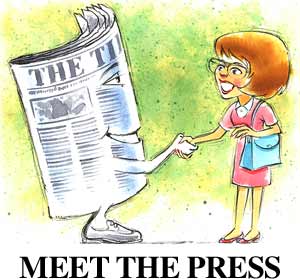 |
|
||||||||||||
|
Columns by Linda Formichelli:
List all of Linda's columns
Visit our other Getting Work columnist
|
You know who holds the key to your IP success? Members of the media, such as myself. Oh, the power! Bwa ha ha ha! Ahem. Seriously, though. You can spend your entire marketing budget (you do have a marketing budget, right?) taking out classified ads in the back of those cheesy "business opportunity" magazines -- or you can use the power (bwa ha ha ha!) of the press to get the word out for free. Know Your Media I wouldn't use my 1099 writing style for Christian Family Magazine, damn it -- and you shouldn't talk to a reporter from a women's mag as if she's working for Maxim. "You need to understand what the media's role is, especially who their audience is and what the reporter covers," says Doniece Sandoval, managing partner of Word of Mouth Communications. Your research will reveal, for example, that a reporter from Parenting wants to learn about the child-friendliness of your new widget, while a reporter from 1099 wants to hear how you're able to promote your widget without a marketing department behind you. Be Prepared If you're a man, you probably had the Boy Scout motto "Be Prepared" seared into your tender young brain. If you're a woman, you're out of luck in that respect -- but don't worry, here's what you need to know. What are some of the basic questions you can expect the reporter to ask? Make sure you have interesting, concise answers to these questions. "I wasn't ready for some of the simple questions the reporter asked, like 'Why do you draw this stuff?'" says IP fantasy illustrator Craig Maher, who was recently interviewed for the Poughkeepsie Journal. "I had to use that old stalling technique -- saying 'Hmm, that's an interesting question' while I racked my brain for an answer." But don't stop with the basic queries. You want to be ready for not just the obvious questions, but also for the kinds of questions that give even seasoned press jockeys sweaty palms. For example, Maher shouldn't prepare only for questions on his style and technique; he should also be ready to answer questions like "What effects do your violent images have on post-pubescent Star Trek fans?" and "Don't women in fantasy realms have access to bras?" Do It on Your Turf IP jigsaw puzzle maker Mark Cappitella has seen his share of misinterpreted quotes and incorrect information. "I do a wedding guestbook puzzle where guests each sign the back of one puzzle piece," he says. "One reporter called it a wedding puzzlebook, giving the impression that it's a book. That doesn't even make sense." Cappitella has had much better luck since he began conducting interviews in his tool-packed workshop. "Getting the press to understand my product is something I have had a hard time doing," he says. "It's such an unusual product, and caters to such a niche market, that 99.5 percent of the population does not understand what I do unless they actually observe me cut a puzzle in front of them or sit down and actually try to solve one of them." (And the proximity of a sharp jigsaw does wonders for a reporter's memory.) Don't Be a Know-It-All Despite all your preparations for being interviewed, there will be times when you'll feel like you couldn't get a clue if you stood in a clue field during clue season dressed as a clue and drenched in clue pheromones. Don't fake it. Much like that burrito you had last night, it'll come back to haunt you. "If the reporter asks questions you can't answer because they are out of your area of expertise, don't guess or make something up," says Rebecca Hart, an independent public relations consultant. "It is perfectly acceptable to say: 'You know, I'm not an expert on that, but I can tell you someone who is.'" You can also offer to get back to the reporter later with the information. Don't Make the Reporter Hate You Here's where I get to rant about my pet peeve: interviewees who sidestep the interviewer's questions, choosing instead to answer every query with an extended monologue on how gee-whiz wonderful they are. I recently interviewed three business owners for a trade magazine. Two of them gave thoughtful answers to my questions about whether fitness clubs should offer yoga classes, so I quoted them extensively in the article. The third business owner turned every question into an ad for his club. No matter how I rephrased my questions, I never got straight answers. If this interviewee had an ounce of common sense, he'd have realized that I wasn't about to turn my article on yoga into a sloppy love note for his business. Instead, I ended up scrapping his interview altogether and going with someone else. (The power!) The reporter has a job to do, and from my experience at 1099, I can tell you that the job specs are usually imposed by an axe-wielding editor. Make sure you help the reporter hand in her assignment without getting chopped to pieces by the editorial axe, or you won't get any coverage at all. Take a Bite As you may have learned from the presidential debates, it's not so much what you say as how you say it. "Make bold statements," advises a freelance news videographer who wishes to remain anonymous. "It doesn't have to be profound or deep -- it just has to be bold." Take the time this anonymous videographer was interviewing locals at the scene of a shooting. "I spoke to a million neighbors who talked about getting hold of guns and getting God back into school," he says. "The sound bite I liked, and brought back to my producer as bite number one, was, 'If we can figure out how to put a man on the moon, then we can figure out how to stop kids from killing one another.' Bam, that's the one you use." So take your long-winded speech, distill it into a few memorable words, and practice saying it with conviction. Don't Dress for Success That's right -- don't dress for success. If you normally work in jeans and a T-shirt, don't go pulling your lone suit out of its dry cleaning bag and getting all gussied up for the reporter. "Wear what you wear to work in, because if you feel uncomfortable, you'll look uncomfortable and the audience won't take you seriously," says Hart. More tips: "For television, avoid pure white shirts or suits with stripes, checks or small patterns. And don't get a haircut right before the television appearance." So there you have it -- treat us right and the power of the press will work for you to publicize your business. Bwa ha ha ha! |
|
|
We'd love to hear your feedback about this column, or put you in touch with Linda Formichelli if you like. You may also like to see her biography. |
The 1099 name and logo are trademarks of 1099 Magazine.

